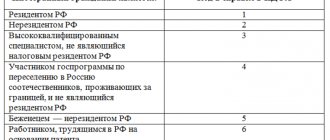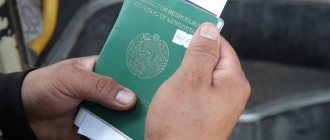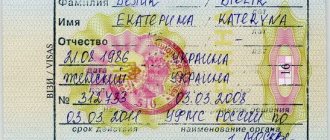Is there liability for illegal work activities?
A foreign citizen or stateless person who has crossed the territory of the Russian Federation in order to start working and earning money must apply to the Main Directorate for Migration Affairs of the Ministry of Internal Affairs and obtain a patent to carry out labor activities. An employer hiring a foreign citizen is obliged to check the latter's valid work permit.
Read about how to check the validity of a work patent here.
For labor relations without a patent, the legislation of the Russian Federation provides for administrative liability for all parties to the labor agreement:
- For the employer under Art. 18.15 Code of Administrative Offenses of the Russian Federation.
- For a stateless person or a foreign citizen under Art. 18.10 Code of Administrative Offenses of the Russian Federation.
Read about whether a migrant needs a patent to work in Russia if he has a temporary residence permit or a residence permit, and about whether individual residents of the Donbass - DPR and LPR need a patent to work in Russia - here.
Expulsion - without patent.
We have already written a lot that working without a patent risks expulsion, that you need to work only with permits and in the region where the patent or work permit was issued. This is undeniable. We also gave many reasons why the deportation could be cancelled. You can find them in the “Blog” section of our website; hundreds of cases are reviewed there. Let's highlight one more thing. We haven’t used this method before, but recently we did. Let's talk.
Expulsion is threatened for carrying out labor activities without a patent. Precisely labor. If you prove the opposite, that there was no work activity, then deportation should not be applied. No, do not prove that you did not work at all, but prove that you carried out volunteer activities and worked for free. Now more details.
Let's assume that you worked for free, carried out volunteer activities: in a church, a charitable organization, a social service, or another non-profit organization.
We see that in this case deportation can be avoided. We have now filed such a complaint and are waiting for the results.
It turns out that if the activity is volunteer, free of charge, then the foreign citizen does not receive payment for his activity. This fact must be confirmed by your “employer”. This is an important point; you need to agree with him either beforehand or afterwards. This, by the way, is in his interests because... he will then avoid a fine for attracting foreign labor.
As a result, it turns out that the activity of a foreign citizen cannot be qualified as labor if it is free. The FMS does not agree with this, but they are wrong and here’s why.
According to Art. 15 of the Labor Code of the Russian Federation, an employment contract with a volunteer cannot be concluded, since labor legislation does not provide for the possibility of involving an employee under an employment contract in unpaid work - on the contrary, one of the signs of labor relations is the performance by an employee of a labor function for pay.
Based on the meaning of the Federal Law of August 11, 1995 No. 135-FZ “On Charitable Activities and Charitable Organizations,” volunteering is not work in any profession (specialty), i.e. is not a labor function. In addition, volunteering does not involve payment of wages. Thus, volunteering is formalized not by an employment contract, but by a civil law agreement concluded between a volunteer and a charitable organization.
From all of the above, it turns out that since you worked for free, there can be no labor relations, and deportation is provided only for labor relations. Now the FMS needs to prove that you had an employment relationship. Of course, the courts do not like this approach. But he is the only true one, they prove it, not you.
There is one more “but”: not every field of activity can be volunteer. This point must be taken into account. You cannot, for example, carry out volunteer activities at a construction site. Agree that this is absurd.
Also, a volunteer agreement already concluded at the time of verification will be a big plus.
Let us highlight one more point: volunteering and helping a friend at a construction site are two different things. In our practice, there were cases when people were expelled for helping a friend at his dacha for free. Seriously. The court qualified this as an employment relationship. Although this is not the case here. The court simply did not look into the dispute; it would have been easier to simply expel him. There are quite a lot of such cases.
We are confident that when volunteering, there is a greater chance that the court will take our position than the position of the Federal Migration Service (Ministry of Internal Affairs). You will need to provide all documents confirming this.
In any case, it is better to contact a lawyer so that he can formulate a defense position.
UPD.: On September 28, 2017, the higher court sent the case for a new trial. We will publish the solution as soon as it becomes available. UPD: 10/12/2017 we publish the decision.
What is the penalty for lack of a certificate and the consequences?
For a foreigner
In accordance with Art. 18.10 of the Code of Administrative Offenses of the Russian Federation, a fine of 2 to 5 thousand rubles plus possible deportation to their homeland faces a foreign citizen or stateless person in the following situations:
- If he is engaged in labor activities in the Russian Federation without obtaining a work permit.
- If he is engaged in labor activity in a specialty (profession, position) other than that specified in his patent (for example, “Occupational worker” is registered, but in fact a stateless person or a foreign citizen works as a seller of food products).
- If a foreign citizen or stateless person works outside the territory of validity of the patent (for example, the patent was received and is valid only in St. Petersburg, and the actual labor activity of the migrant takes place in Moscow).
For the cities of Moscow and St. Petersburg, as well as the Moscow and Leningrad regions, you will have to pay a larger fine than in other regions. Here, for violating an article of the law, it will be necessary to contribute from 5 to 7 thousand rubles to the budget with mandatory deportation from the country.
If within a year a migrant commits a repeated offense under this article, he will be subject to a fine of 5 to 7 thousand rubles with mandatory deportation from the country to his homeland. That is, if there were no precedents for this offense (except for Moscow, St. Petersburg, Moscow and Leningrad regions), then only a monetary fine is imposed. If you relapse, you will be subject to a fine and deportation outside the Russian Federation.
The absence of a work permit is also equivalent to the presence of a fabricated patent by a migrant or a patent whose validity has long expired.
Read about how long a work patent is valid for foreign citizens and how to extend it here.
For employers
An employer may be fined for the following offenses committed by him:
- Hiring a foreign citizen or stateless person without a work permit.
- Hiring a migrant to a position that does not correspond to his right to engage in the relevant types of work (as stated in the patent in the “Profession” column: a bartender does not have the right to be a construction foreman!).
- Hiring a migrant outside the patent territory.
- Lack of permission to employ foreign citizens.
The following types of fines are provided for employers, depending on their legal status:
- For ordinary citizens – from 2 to 5 thousand rubles.
- For officials - from 25 to 50 thousand rubles.
- For legal entities - from 250 to 800 thousand rubles, or they can suspend the organization’s activities for up to three months.
Important. For the absence of a permit for each working foreigner or stateless person, the employer will have to pay a fine separately.
For example, a citizen has three foreign citizens working on the construction of a house without a work permit. If administrative liability occurs, a fine of 6 to 15 thousand rubles will be imposed. And if an official is charged with such an offense, the fine for three illegal immigrants will range from 75 to 150 thousand rubles. For a legal entity, the fine will range from 750 thousand rubles to 2 million 400 thousand rubles.
How to punish for working without registration
The Federal Tax Service will hold the businessman accountable for unregistered activities through the courts. The case will be considered at the place of residence of the accused or the place of activity within two months from the date of drawing up the protocol on the violation.
The liability provided for running a business without registering as an individual entrepreneur can be tax, administrative and criminal, it depends on the amount of income and the type of violation.
They can be punished not only for running a business without registration. If the amount of income from an unregistered business does not reach criminal liability, then the tax office itself will fine the unregistered individual entrepreneur - 10% of the income received, but not less than 40 thousand rubles. And if a business needed a license, then you will have to pay a fine to the Federal Tax Service in the amount of 2000-2500 rubles. with confiscation of equipment and manufactured products.
Administrative responsibility:
- Business without registration - fine from 500 rubles. up to 2000 rub.
- Business without a mandatory license - fine from 2000 rubles. up to 2500 rub. with confiscation of equipment and manufactured products.
Reason: Article 14.1 of the Code of Administrative Offenses of the Russian Federation
Criminal liability
- Income from 1.5 million rubles. — fine up to 300 thousand rubles. or in the amount of earnings for two years, or up to 240 hours of compulsory work, or imprisonment for up to six months.
- Income from 9 million rubles. — fine up to 500 thousand rubles. or in the amount of earnings for three years, or imprisonment for a term of up to five years with a fine of up to 80 thousand rubles. or in the amount of earnings up to six months.
Reason: Article 171 of the Criminal Code of the Russian Federation
Tax liability
- Violation of business registration deadlines - a fine of 10 thousand rubles.
- Receiving income from an unregistered business - a fine of 10% of the income received, but not less than 40 thousand rubles.
Reason: Art. 116 Tax Code of the Russian Federation
Anastasia Borodina, head of the legal department of SAMKORP LLC
If your business activity is related to the retail sale of alcohol and alcohol-containing food products, you need to be prepared for the liability provided for in Part 2 of Art. 14.17.1. Code of Administrative Offenses of the Russian Federation in the form of a more significant fine in the amount of 100,000 rubles. up to 200,000 rub. with confiscation of products.
Actions after a fine or punishment has been imposed
Once the punishment is determined and the corresponding decision is made, it must be fulfilled within the time limits established by law - pay a fine, travel outside the Russian Federation or suspend business activities. This applies to both the migrant and the employer.
If the organization does not agree with the results of the inspection by the territorial body and decides to challenge the prescribed fines, then it will be necessary to go to court with an inspection report that describes all the violations, evidence and facts.
What happens if you don't follow the instructions?
If a foreign citizen was sentenced to deportation from the country and he did not fulfill it within the prescribed period, then clause 3 of Art. 20.25 of the Code of Administrative Offenses of the Russian Federation “Evasion of the execution of administrative punishment” and he will have to pay an administrative fine in the amount of 3-5 thousand rubles and administrative expulsion from the Russian Federation.
Reference. An illegal immigrant who has already been ordered to leave the country, and is caught again for the same offense, is placed in a special temporary detention facility for foreign citizens - SUVSIG, then they buy a ticket and are sent home.
Did not provide information for tax control
Forgetfulness regarding tax matters almost always has negative consequences. Even if it seems to you that the tax office requires something insignificant, for example, to provide information for tax control. This information includes form 2-NDFL (for employees) and information about the average number of your employees, and report 6-NDFL.
For each forgotten document you will have to pay a fine of 200 rubles. The fine for forgotten 6-NDFL is 1000 rubles.
Is it possible to mitigate or reduce the punishment?
The fact of employment without a patent is a violation of labor and migration laws on the part of both the employer and the employee. If the law requires a preventive measure - deportation from the country, then the court can take into account such mitigating circumstances as the residence of close relatives in the Russian Federation (children, spouses, parents, adoptive parents, grandparents, grandchildren, sisters, brothers) and choose a more mild punishment.
Mitigation of punishment for employers is provided for in Article 112 of the Tax Code of the Russian Federation if the offense is committed under the following circumstances:
- due to particularly difficult family or personal circumstances;
- due to the official, financial or other dependence of the offender;
- under duress or threat;
- difficult financial situation.
We discussed the specifics of hiring foreigners with a patent, as well as information about taxes and the cost of a patent in our other articles.










